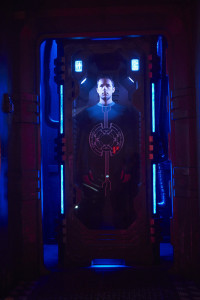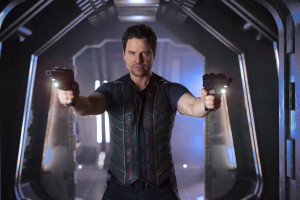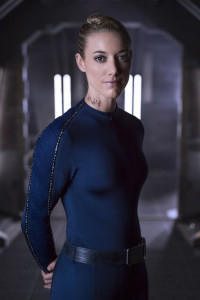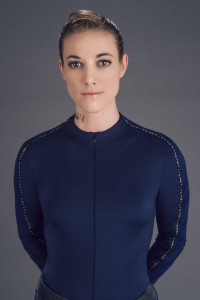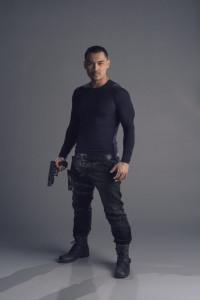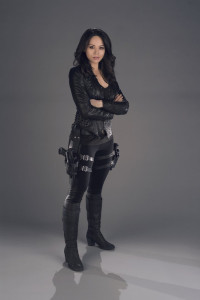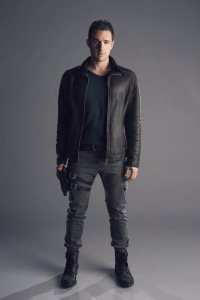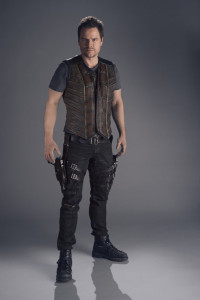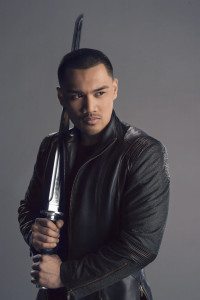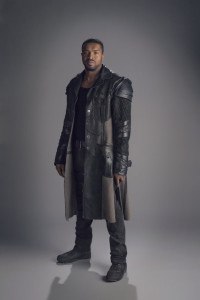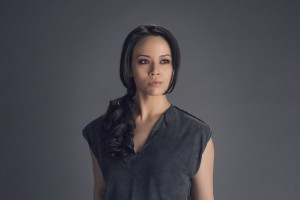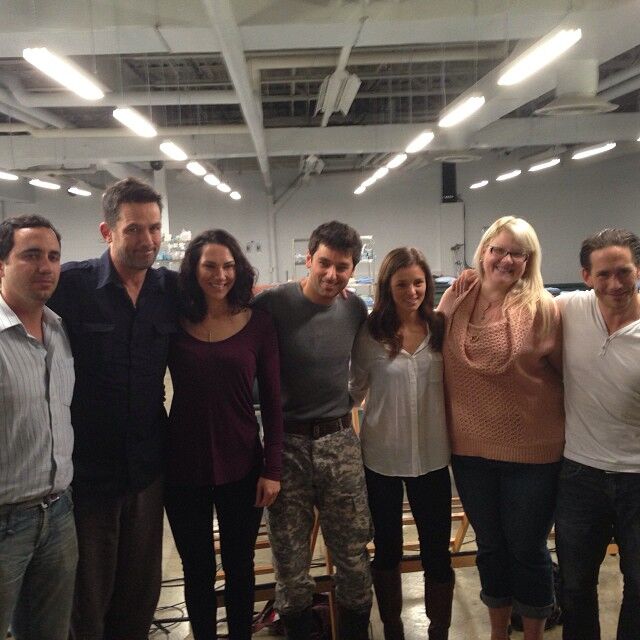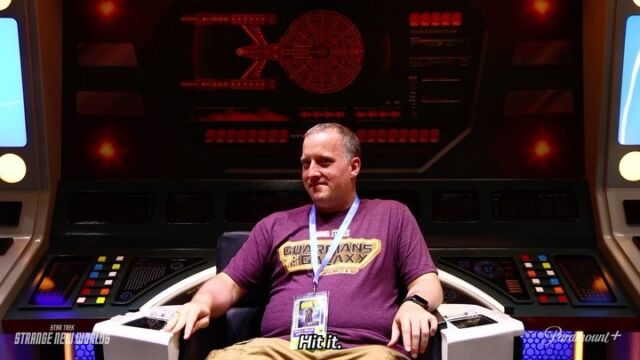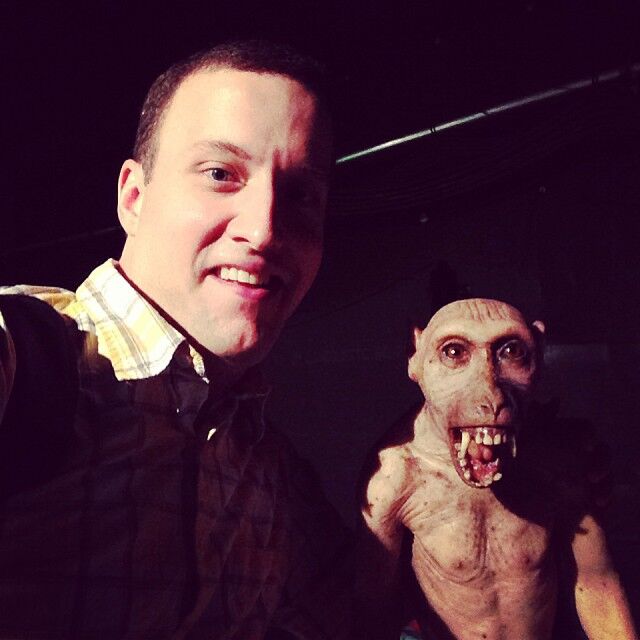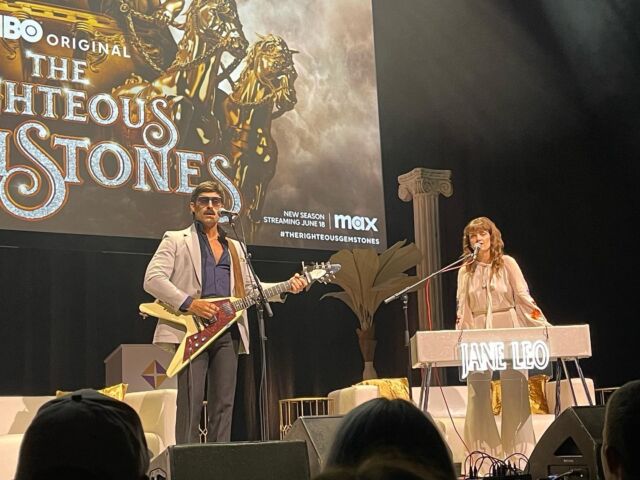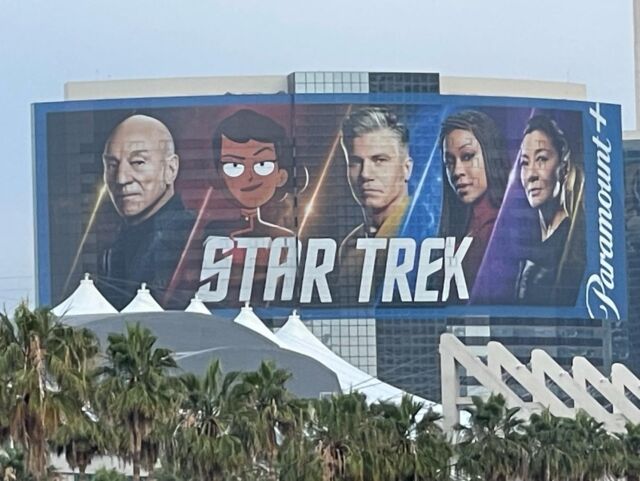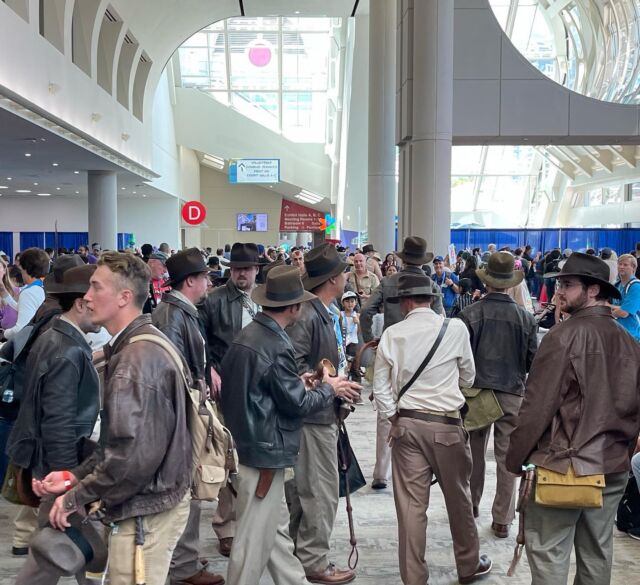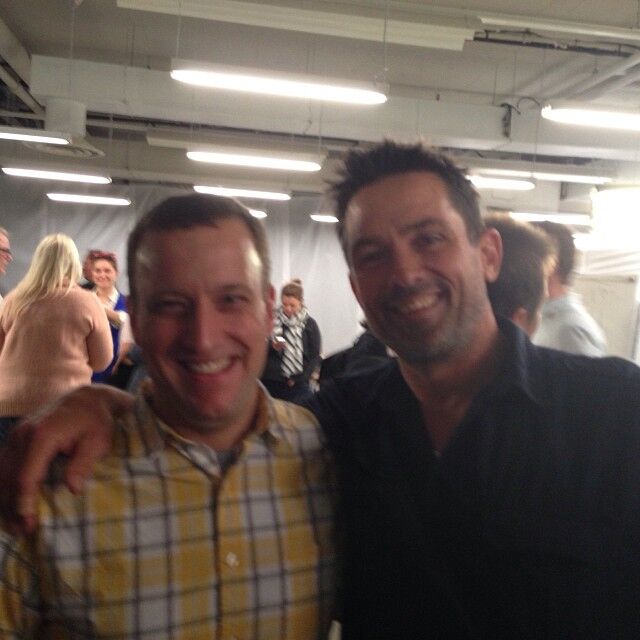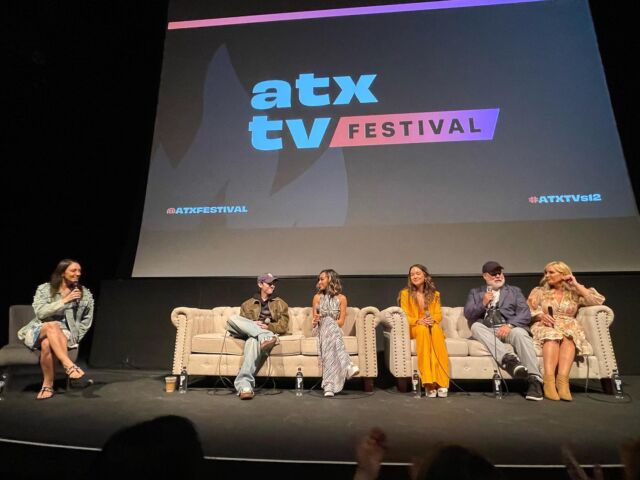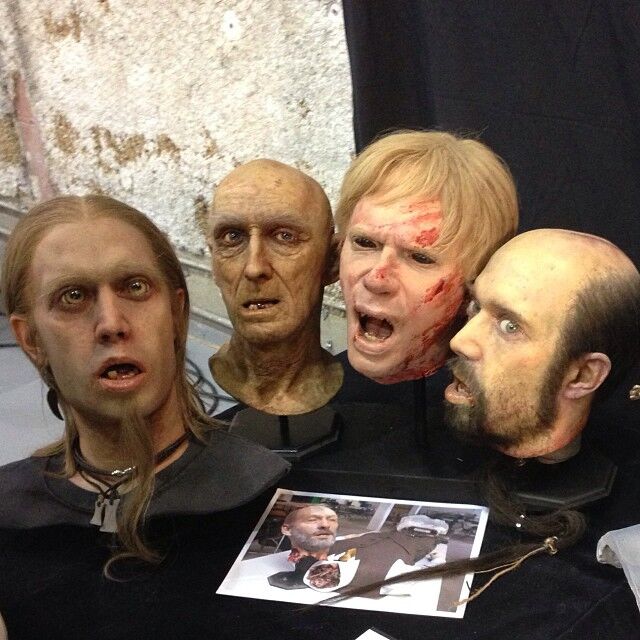
DARK MATTER — Season:1 — Pictured: (l-r) Zoie Palmer as The Adroid, Alex Mallari Jr. as Four, Anthony Lemke as Three, Melissa O’Neil as Two, Mark Bendavid as One, Jodelle Ferland as Five, Roger Cross as Six — (Photo by: Dennys/Ilic/Syfy)
Tonight Syfy kicks off its all-new series Dark Matter, which is based off the graphic novel of the same name. The series follows six strangers as they awake from stasis aboard a spaceship and have no idea who they are or what they are doing there.
Earlier this week, I had the opportunity to participate in a press call with executive producer Joe Mallozzi and stars Melissa O’Neil, Marc Bendavid and Anthony Lemke. They had a lot to say about this exciting new series…
The actors learned what was going on along with their characters. Did that make it more difficult for the role?

DARK MATTER — Season:1 — Pictured: (l-r) Melissa O’Neil as Two, Anthony Lemke as Three — (Photo by: Dennys/Ilic/Syfy)
Melissa O’Neil: I actually loved it. Being a first-time performer on television, I didn’t really know what to expect, and I – and I thought that it was such a lovely thing to encounter that we were going through what our characters were going through. At the same time, you know, we were – we were discovering what was happening and how to interact with each other in the exact way that our characters would be doing it, you know. We were just piecing it together as it came to us. But, I think that there is a great bit of truth, you know, that’s happening on screen that – you know, we’ve all done our homework to prepare our characters as much as we could.
But, there is honesty that’s happening there as we navigate that.
Marc Bendavid: Yes. I found that – I mean, it might seem sort of contrary to what you often hear actors saying about preparing their role. I found it really liberating and unusual because there’s very little to go on. There’s very little to prepare other than a kind of openness and to what I would react like myself to these people in these situations. So, there is no history. You know, at one point, I asked, should I watch every episode of “Stargate” or “Star Trek” ever produced. And he said, “No.”
And it seems like to be able to come to work with, you know, in essence, given the other characters and the other actors in the cast a real big say into how one ends up because he is really torn until he encounters Two and until he encounters Three and the rest of the cast. So, I actually – I like it because it meant that we have to be on our toes, listening to each other and just seeing where the scripts took us and, you know, making a lot of decisions beforehand. So, for me, I really enjoyed that, actually.
Anthony Lemke: Yes. I think – I think one of the things you learn very early on in your acting career or in – when you’re studying acting is that, you know, preparation is key. You should – you should definitely answer all the questions about your character. You should have done all of that homework. And, then, when you show up on the first day of shooting, you should forget it all and just play the role and play the reality of the moment because that’s going to be there.
And so, in a way – in a way, the forget it all part is where we started. And that – just like Marc said, it’s incredibly liberating and we were sort of discovering, you know, things about ourselves as characters that – well, I can’t – I mean, listen, we did have a lot of scripts, to be fair. We had a fair number of scripts moving forward. So, you know, by the first frame of camera, we were able to read, you know, three or four, five, six, seven episodes ahead. And, so, at least we knew that as our back story. “Listen, this is an interesting piece of information that, you know, my character doesn’t have on day one but me as the actor does have.” So, there is – there is a little bit of that forward prep that was – that was in – I think probably influencing our day one shooting decisions as well.
Can you talk about the first time you worked with the cast because you guys have really great chemistry together. Was that instantaneous?
Melissa O’Neil: Thank you. I think that that has a lot to do with Joe and Vanessa and Lisa Parasyn – what they did with casting, you know. We do get along very well – all of us. We have a lot of fun on and off screen, and I think that that has a lot to – the credit goes to the lovely people that chose us. Yes.
“Dark Matter” is based on a graphic novel published by Dark Horse. How much of the content from the graphic novel can we expect to see on the series?

DARK MATTER — “Episode One” Episode 101 — Pictured: Alex Mallari Jr. as Four — (Photo by: Ben Mark Holzberg/Syfy)
Joseph Mallozzi: You can expect to see all of it. Actually, the comic book was based on, basically, the pilot that we have envisioned. So, you know, it’s almost – you know, if you read the first two issues of the comic book, it’s almost, word for word, the first episode of the series. And in episode – the issues three and four of the comic book are very close to episode two. So, you know, in terms of spoilers, you guys are going to get a sneak peek at episodes one and two by reading the first two issues of the comic book or, you know, as in the paperback. But then, after that, all bets are off.
For those who aren’t familiar with the comic book, how would you describe the series?
Joseph Mallozzi: You know, I would describe it as a sci-fi series with a cable sensibility. You know, I’ve always been a big fan of, you know, cable shows with twists and turns and surprises, you know, that always leave you at the end of the episode going, “Oh my god. I can’t wait until next – you know, next week” and, you know, you get to the boards, you discuss them or you go to work and, you know, it’s the first thing you talk about in the morning. That’s the show I wanted to create.
So, you know, it’s something that, you know, a lot of – a lot of setups but a lot of payoffs along the way, you know, the mystery at its heart. It has a sense of humor, kind of a – it’s a fun, ship-based sci-fi (fuse) which something, I think, fans have been dying for. But, at the end of the day, it’s really about the characters and this great group – this great, you know, group made up of this crew. And, you know, I’ve often said viewers tune in for the hook but they stay for the characters. And we’ve got an incredibly colorful bunch of characters in this show.
Melissa O’Neil: Yes. I think that there is – the show – it’s – obviously, it’s – there is no singing in it. But, it’s – it has a quality like I want to call it a space opera. Do you know what I mean? There is just so many wonderful things happening and the story lines are fantastic. And the fact that we’re an ensemble, you get to see a little snippet of everybody’s past and where they might go. And I think that’s really exciting. Everyone – there is – there is a person for an audience member, you know. There is – there is a character for any kind of audience member out there. It’s great.
Joseph Mallozzi: Yes. One of the – one of the things that I was really heartened by was, you know, just getting reactions from people who watched the show for the first time. And they all respond to different characters, which is great. And, you know – you know, the sound guys and the editors all – you know, when they first watched it, they all responded. They love Jodelle’s character, you know. There were those who love Roger’s character, who love Anthony’s character. I mean, you know, those two early reviews, you know, super positive reviews – they were – they loved Melissa’s character. So, you know, it’s a testament of the fact that there are so many colorful characters, very, you know, different characters, but also a testament to our fantastic cast who have brought them to life.
There is been so many space dramas that have been done. In fact, some other ones that are coming up, we have “Killjoys” which premieres next week and then “The Expanse” later this year. Why do you think that this series is apart from the rest and what would you tell viewers to get down to watch? I’ve watched the pilot, by the way, and I love it. So, what could – would you tell other people?
Joseph Mallozzi: Well, it’s – first and foremost, it’s a ship-based sci-fi which, I think, differentiates it from anything else out there.
Tonally, it’s a lot of fun. I mean, you know, you watch this at the pilot and there’s more of that. I mean, you know, at the end of the day, I think, you know, fans, you know, like to tune in for the character and just essentially to have a good time. And I think that’s what we’re going to offer them.
And at the same time, you know, like I said, I’m not sure how serialized the other shows are. But, our show is very serialized in that, you know, I mentioned those twists and turns and surprises.

DARK MATTER — “Episode One” Episode 101 — Pictured: Mark Bendavid as One — (Photo by: Ben Mark Holzberg/Syfy)
There’s going to be a lot of reward for – you know, for the audiences who tune in. And, you know, it’s funny. I mean, you know, I was developing this for so many years that, you know, we’ve got like a great game plan. When Paul and I and my writers sat down and developed the first season, we had all the setups and payoffs. So, I mean, there was this one big revelation at the – you know, late in the season, I remember, and one of the actors come out and it’s like, “Wait a minute. Was that a hint way back in episode three?” And was like, “Yes.”
So, I mean, it’s kind of fun. It’s, you know – it’s – you know, it’s the type of show that basically you can – definitely binge-worthy – you know, binge-worthy but also the type of show that, you know, when those little payoffs come up along the way, you can go back to those earlier episodes and kind of piece things together. So, I think, you know, like I said, fun – that sense of humor, ship-based and, you know, it’s just, I think, you know, very, very binge-worthy.
Through most of the episode, everybody really has no perception of what they are. And then, in the final moments, they have a perception imposed upon them of who they actually were. Will we see them challenged to go forward with a persona that they can now write for themselves or to fall back on the persona that they have been told they had previously?
Joseph Mallozzi: It will different for different characters.
And, you know, it’s interesting. I mean, I just love – I always love this idea that, you know, people make mistakes in their past – in their past and, you know, they can, you know, move forward, hopefully, or sometimes not. And, you know, it’s just – it’s fun to explore that kind of journey with different characters. And like in real life, it’s not going to be happy ending for everyone.
You know, I just – you know, as Melissa said, it’s just very interesting in that, you know, like the audience, these characters essentially start tabula rasa, right? And, you know, you’re following along on the adventures with them. But, I mean, if you take a look at – you know, in the pilot episode, they – once they fall back, basically they are able to sort of trigger certain aspects of their former self like Melissa’s character to the way she takes command of the ship and the way everyone lets her take command of the ship really speaks to, you know, the strength of her character.
Melissa O’Neil: Yes. I think – I think that’s one of the greater struggles that we have with the concept of this show as our characters. It’s that, you know, we wake up and we are who we are in that particular moment. And then, we are confronted with these facts about who we were, and how do we walk through our lives having everybody else who we don’t remember know who we are, know what we are capable of and treat us like that? You know, how do we move forward into that kind of a landscape? It’s very interesting, I think.
The title, “Dark Matter,” what is that referring to? And are we going to see that be incorporated throughout the season?
Joseph Mallozzi: I guess it’s a darkness that resides in all of us.
When you said that this is a ship-based show, does that mean that there aren’t going to be going to various planets very often? Is most of the drama going to be actually taking place on the ship?

DARK MATTER — “Episode One” Episode 101 — Pictured: Anthony Lemke as Three — (Photo by: Ben Mark Holzberg/Syfy)
Joseph Mallozzi: No. It’s going to be a little of both. I mean, you know, we have an amazing standing set and we’re going to make use of it. I mean, you know, as is the case with most of the ship-based shows like “Star Trek” or “Stargate”, you know – or “Firefly,” the ship almost becomes a character in itself, and we have like an amazing, amazing ship. But, you know, we’re going to be getting off. We’re going to be visiting planets. We’re going to be visiting space stations. So, you know, it’s – we’re – it’s not – you know, we want to avoid that claustrophobic feel. So, we’ll definitely be opening things up.
Can the actors talk briefly about their characters and kind of what they like about them and what challenges there are in playing them?
Marc Bendavid: I can just in there. My character, One, is really enjoyable to pay, for me at least, because he is surrounded by people who have some kind of quick proficiency at something and he is sort of is always falling on his face like he always makes a mess of himself. You never see any malice or vindictiveness really in him. But, for me, it was fun to be around all these sort of like sexy, lightning-fast action figures and sort of, you know, be the one whose jet pack seems to be broken. Yes. You know, that, for me, was – that, for me, was fun.
Melissa O’Neil: One time, we were doing a cast read-through. And we were sitting around the cable room, and I think it was Anthony who remarks that most people who are actors are actually the younger sibling or the only sibling or – sorry – the only child in a family. And as we went through on the table, everyone was either a younger sibling or an only child, except for me. It definitely caters well to who Two is in that she very organically and actually takes on this leadership role that everyone seems to just accept, you know. Yes. She was so much fun. She is – she is direct and straightforward and she gets to kick a lot of ass.
Anthony Lemke: It’s just like Three to show up late to a party. I’ll jump in about Three. He is – if you heard everything about – that Marc said about One, that’s pretty much the opposite of Three. And if I could extend the jet pack analogy, I’m the guy with the jet pack that works but doesn’t always know the right thing to do with it. And that’s the fun Three’s character, that he is impetuous and he says what other people may or may not be thinking but certainly what he is thinking that he shouldn’t say. And it’s a lot of fun to play that kind of character and especially within the context of a crew who – you know, each of us is so well-defined. And, so, to be able to play that role within this team is doing a lot of fun.
Can you each describe your character in three words and, for Joe, describe the show in three words.
Marc Bendavid: I would say fun, funny and exciting.
Melissa O’Neil: For Two – She is strong, smart, a fighter.
Anthony Lemke: I’d say Three – cocky, crass and caring, surprisingly. That shall be answered as you watch the – watch the show.
Joe, I couldn’t help but notice that “Dark Matter” began sort of the way “Stargate Universe” ended. Everyone went into spaceships on “Universe” and then came out on “Dark Matter.” Was that a conscious decision?

DARK MATTER — “Episode One” Episode 101 — Pictured: (l-r) Zoie Palmer as The Android, Alex Mallari Jr. as Four — (Photo by: Ben Mark Holzberg/Syfy)
Joseph Mallozzi: You know, I started developing “Dark Matter” way back when I was working in Atlanta. So, I have no idea how – you know, we were going to do “Stargate Universe,” much more how we would end it. You know, it was coincidental. But, I mean, the first person who actually brought it to my attention was actor Patrick Gilmore who played Dale Volker on “Stargate Universe.” He was like, “Wait a minute.” And I was like, “Aha, that is kind of funny” because at the end of “Universe,” of course, everything goes into spaces, you know, while they wait, you know – how long this jump is going to take. And that’s how we, you know, sadly, ended the series.
And I guess – you know, I guess it’s kind of appropriate in that, I mean, just – you know, there is a definite heavy “Stargate” influence on “Dark Matter,” just, you know, the types of shows we used – you know, the type of rating – we used to do it on “Stargate,” you know, relied heavily on the humor. It was very character-driven, you know – you know, a lot of fun. And, you know, at the end of the day, this really focused on this team, this family. And it’s exactly the same thing with “Dark Matter.” So, appropriately enough – but, yes, it works out.
Are any plans to have any old “Stargate” faces as guest stars in the future?
Joseph Mallozzi: Yes. Absolutely. We brought David Hewlett, who played Rodney McKay. He plays the part of Tabor Calchek, who is the team’s handler. So – Torri Higginson, who played Elizabeth Weir on “Stargate Atlantis” is going to be Commander Delaney Truffault, one of the corporate ships. And I have a couple of other guest stars in mind for season two that I can’t reveal yet. But, “Stargate” fans are in for a treat in that respect.
Joe, you were talking about this being a ship-based drama. Usually, I shows like that, the ship is actually kind of another character. Can you talk a little bit about this ship on the series and how it plays under the tone and feel of “Dark Matter”?
Joseph Mallozzi: Yes. I think the ship is a reflection of the characters. I mean, you know, we wanted – you know, when designers designed the ship, we wanted something kind of badass, you know, kind of smaller – I mean, I describe it as almost like a – like a – like a little gold box, you know, just retrofitted with weaponry. She has a lot of experience, a lot of battle scarring, but it’s the type of ship that you kind of look at—and easy to underestimate—but, in battle, more maneuverable, a lot more savvy. The hero ship doesn’t get the upper hand on ships because of its size. And I think that, you know, the ship is a reflection of all our characters who – you know – you know, you don’t know very much about them on the surface but, as you dig deeper, you know, there is – there is a richness there and aspect that, you know, will surprise.
Anthony Lemke: I think that – I was going to jump in here as well if I can, just really quickly because one of the things I noticed from – as an outsider is reflective – was that – you know, often, you see ship-based shows and they’re being driven kind of like – kind of we drive our own cars today by the folks involved. And it’s not always the case. But, we have – you know, our interaction with the ship can be very manual in that way. But, it also goes through the android character.
So, in a way, as an actor looking at what the ship is, you know, the android was a real sort of interface with the ship for us for a lot of reasons. And, so, the ship, in a way, almost has its own character as well through the character of the android, which is, you know, an add-on to the ship but is definitely integral in the ship’s – in the ship’s system. So, to me, that’s just a neat little point that Joe brought in there.
Primarily, it’s through the android that we interact with the ship in terms of commands and, you know – Two, I’ll let you – Melissa, I’ll let you talk a little bit more about that because, you know, being the leader, you interacted a lot more with the ship and the android than I did. That’s for sure.
Melissa O’Neil: Yes. There was a lot of – a lot of what Two does with the android is she was basically trying to pick the android’s brain and figure out how to get things done. But, when we’re in a battle situation and things need to happen quickly and efficiently, once there was a basic trust that was established, you know, a lot of the time we – or, rather, Two just instructed the android to watch himself if he was right in that particular moment. But, we work in tandem a great deal to navigate but mostly to make – tackle out decisions when we are in space battle.
Joseph Mallozzi: I think Anthony brings up an interesting point that the android is a reflection of the ship in a way. I think it’s not a – it’s not an accident that he will be one among us who knows how to fly the ship and Melissa and, in a weird way, it feels like the ship is, in a sense, kind of mother to the crew. There are a lot of mysteries about the ship that we don’t know yet, that we don’t understand, and we can’t quite compute how they influence and inform our personalities.
But, in a strange kind of way, the ship takes care of us. And Melissa being the person who sort of runs the show and being the de facto mother of the – of the crew, I think it’s a – I think it’s a sort of beautifully mysterious reflection of that relationship, you know. Sometimes the ship is really angry. Sometimes the ship seems to save our butts in the last second. So, yes, I think this is no accident that Melissa is at the controls.
And when – I mean, listen, it’s both mother and warrior in a way. I mean, I remember reading a fantastic book called “Wired for War” that’s all about, essentially, artificial intelligence and robotics in warfare. And it’s pretty clear that, you know, the technology currently exists for F16 robotic AI pilots to essentially, 100 percent of the time, beat humans.
So, if that exists today, then take that out into the future and ask yourself how much the humans would be involved versus how much the robots and artificial intelligence would be involved in any warfare or dogfight scenario. And that’s – you know, I think that’s something that Joe has dealt with that unfolded really, really well in the show, that that – you know, asking the question of what is the place of the human not just in warfare but in a society where there are these other beings that exists that we have created that, in a lot of ways, can beat the snot out of us. I mean, you know, to be crass – and I think that’s an interesting and central element to, you know, thematically to the whole show.
Kyle Nolan: Can you talk about like the relationship between the characters because they seem to get along really well when they’re strangers but, then, there’s some butting heads of One and Three by the end and how that relationship is going to change once they know the truth about their past and do they trust each other anymore or does it make them trust each other more or how it evolves?

DARK MATTER — Season:1 — Pictured: (l-r) Alex Mallari Jr. as Four, Mark Bendavid as One, Roger Cross as Six, Anthony Lemke as Three — (Photo by: Dennys/Ilic/Syfy)
Joseph Mallozzi: I think trust – I mean, you’ve nailed – the word trust is – that’s another one of the central elements of the entire first season, really. And it ebbs and flow. I mean, if you wake up without any memories or any knowledge of who you are or who your friends are or who your enemies are and, you know, if that notion of trust becomes paramount to keeping the team together and just staying alive – and, I think, you know, that’s something that the characters struggle with throughout the entire show, without a doubt.
Yes. There is going to be, you know, constantly shifting alliances. But, it’s kind of very interesting the way some of these early relationship form or don’t. Like right off the bat, you know, One and Three clearly, – whereas, you know, the character of Six played by Roger Cross instantly bonds with the character of Five, played by Jodelle, which is like just a wonderful relationship. You know, it goes back to this idea that, you know, even though their memories are wiped, you know, those instincts remain. And so, you know, you can get a sense of what these people were or, you know – or the types of relationships that existed prior to them entering phases very early on.
Kyle Nolan: And, Joe, you had mentioned like season two. I know – I don’t think anything is going to be announced yet. But, so, are you planning – are you planning one complete arc for this first season so it tells one complete story? Or are we going to get one of those like SG-1 cliffhangers and keep our fingers crossed for the second season?

DARK MATTER — Season:1 — Pictured: (l-r) Zoie Palmer as The Android, Melissa O’Neil as Two, Jodelle Ferland as Five — (Photo by: Dennys/Ilic/Syfy)
Joseph Mallozzi: You know, I approach each season as a – as a – as a book in a – in a series. So, the definite beginning, middle and end, like a season-long arc, is not to say it’s not going to end in necessarily a cliffhanger but, I mean, you know, very early on, we established some – we have some questions that get established very early, you know, versus about the mind wise, and what’s going on. And as the season progresses, you know, we begin to peel the onion on these various characters and their back stories and who they are and, essentially, the mixed views of how they ended up on that ship and what happened to them.
You know, one of the things that I promised fans is we are not going to be the type of show that is going to ask a lot of questions and then leave then unanswered. We are going to ask a lot of questions, we’re going to keep asking a lot of questions, but we will pay them off along the way and in the most satisfactory fashion.
Joe, considering this is “Dark Matter,” would you say the show aligns a lot more with the tone of “Stargate Universe” than the previous ones – previous “Stargates”?
Joseph Mallozzi: You know, I want to say, basically, it falls somewhere in between because one of the things that, you know, “Universe” did so well is it dealt with kind of the bigger issues. In our series, there is a bigger issue of, for instance, redemption. You know, are people born bad? In that respect, it’s a lot like “Universe” in terms of tone and in terms of look. And yet, you know, one of the things that I know a lot of fans were missing on “Universe” was that sense of humor that really marked “Atlantis” and “SG-1.”
But, that’s what we have, you know – you know, it’s one of the biggest, I think, characteristics of this show, “Dark Matter.” It’s its sense of humor. It’s – you know, I keep on emphasizing fun. And, you know, “Atlantis” was fun, “SG-1” was fun. Maybe some fans did not consider “Universe” fun because it was a little dark. It was a little slow to get going, you know, more introspect, a little claustrophobic, which basically “Dark Matter” is not. So, “Dark Matter” is fun. So, I think, you know, for “Stargate” fans, if you love “Atlantis” and “SG-1,” I think you’re going to love “Dark Matter.” And, frankly, if you love “Universe,” you’re going to love “Dark Matter.” It’s the very best of all three shows.
You describe the show often as fun and, obviously, mysterious. What about the level and types of action viewed might be able to expect? Will the action, whatever level there is, be comprised mostly of ship-to-ship combat or hand-to-hand fighting or equal measures of both?
Joseph Mallozzi: We do it all. There’s gun play. There is hand to hand. There is ship-based action types. First of all, I want to talk about the visual effects of the show. We brought in our guys from “Stargate.” Lauren Bancroft-Wilson and Mark Sevilla have been working through the atmosphere. And, you know, our show – our visual effects, I think, are second to none. We just ran a real efficient production. We put the money up on screen. And I put our visual effects up against any other show out there. They look fantastic.
The gunplay has been fantastic. We have a great stunt coordinator in John Stead, who coordinated some fantastic gunfights, for instance, in episode one or two which, hopefully, you will see sooner than later. It’s all unbelievable, A, because John Stead is so amazing but also because the actors are so amazing.
And here, I asked to talk about Melissa O’Neil, who, you know, goes in there on the weekend and basically works on the choreography and does such a phenomenal job that when we are in the editing room, you know, in other shows, you would basically have to cut to the stunt woman, you know, to make it more convincing. But, because Melissa is so good at what she does. And, you know, occasionally, we’ll cut in for the close ups. But, I mean, you know, for the most part, you know, when you see the fighting up on screen or Two fighting up on screen, that’s Melissa.
For Melissa and the boys, one quick question. Was there any standout stunts or, perhaps, even injuries that are most memorable for you from the season?
Marc Bendavid: Well, I’m missing a leg. But, that’s episode 10. So, when you get there.

DARK MATTER — “Episode One” Episode 101 — Pictured: Jodelle Ferland as Five — (Photo by: Ben Mark Holzberg/Syfy)
Melissa O’Neil: So, there’s a huge fight that we do in episode 10 or I think it’s actually episode 11. And there was this big – this was this flying move where you like lunge and you travel like 4 feet across the floor to get to the – my opponent. And in the rehearsal, I nicked the girl’s toe like she was a little bit too close or I went too far and I did this – it was practically a Home Alone fall, which is – it’s named after it, where the guy goes right up into the air and you got one leg up when you land. And I landed on the floor in our medical room which – the floor in the medical room has all of these intricate geometric patterns on it. And it imprinted onto my palm and it didn’t go away like there was this massive blood blister on my palm in this beautiful like geometric print.
Anyway, it was gone about a week after we were done shooting, like four other episodes had to go by and a week of time off before it finally went away. It was so weird but really cool-looking. There is a picture of it on my Instagram.
Anthony Lemke: Marc, tell your injury story.
Melissa O’Neil: Yes. Your feet.
Marc Bendavid: We got to this beautiful set when we all sort of, you know, gawked at in admiration. And the floor of it was, you know, so – like Melissa said, beautifully intricate with geometric shapes, you know, carved out of hard plastic. And when we got – when we got to work on the first day, you know, Joe and Paul said, you know, “You come off stages barefoot,” you know, because we leave shoes in the stages.
And, so, we need to shoot this scene of you and Melissa running down the hallway of the ship, which because it’s broken, is dark and covered with little bits of spark and fire, and we need to shoot it for the entire day. And, so, by the end of the day, Melissa and I had sort of hobbled ourselves, with bloody feet running back and forth across the hall. [Melissa] never complained about it once and, you know, I’m still harping about my bloody feet six months later.
Anthony Lemke: Yes. Listen. You know, in terms of bruises, like the ego is probably the biggest thing that got bruised in a fantastic fight with Ruby Rose that my character has that – you know, one of the things that John Stead does so brilliantly well is – you know, yes, he is a great fight coordinator and, to be honest, we don’t actually have a lot of injury stories.
And that’s thanks to John Stead, you know, his preparation. He will never let anybody get in there without 100 percent preparation that he feels like – you know, he feels like someone may be getting – you know, getting a little tired or sloppy or, you know, a stunt person goes in there and there’s top out. You know, it’s – he is fantastic. And he tells stories with his fights and his choreography as good as, if not better, than anyone I’ve ever worked with. And he is – he is wonderful and there is a – there is a – there is a fun fight with – between Three and the Ruby Rose character. And that’s the one that – yes. Well, I’ll just leave that one up there as probably my highlight fight of the entire – of the entire season for my character.
Is there – is that a rigid plan with the series as far as the arc? Or as these guys kind of inhabit the characters a little more, is there a plan to kind of maybe deviate a little bit based on who they do their performance?

DARK MATTER — Season:1 — Pictured: (l-r) Alex Mallari Jr. as Four, Roger Cross as Six, Anthony Lemke as Three, Melissa O’Neil as Two, Mark Bendavid as One, Jodelle Ferland as Five, Zoie Palmer as The Adroid — (Photo by: Dennys/Ilic/Syfy)
Joseph Mallozzi: Sure. That – you know, there is always, you know, room for movement. I mean, I have kind of the general idea of where I want to go. You know, just in terms of going to season – you know, the first season, you know, we were super prepared. We have the majority of our scripts already done. And then, you know, we made adjustments along the way. And, you know, one of the things that we are – we are – you know, we are doing – and as we build stories for season two, again, assuming we get season two – but, I’m fairly confident – is, you know, just going off what the cast has done.
And, you know, essentially, you create these characters, you know, they’re on the page and then you hand them off and, then, they really come to life. And, you know, it’s – you know, you create the characters, you know, you see on the page. But, you know, the actors bring so much to them in develop them and they re-evolve in their performance and as you inform moving forward, it gives you ideas. I mean, you know, a lot of our ideas for season two – these stories for season two come about as a result of something like they could be – the standout moments that these guys have brought to the show and just the types of relationships and the chemistry.
And, guys, for the actors, you know, it’s kind of like everybody always got along. And it’s great that in your show, you guys don’t get along. And what I liked in the pilot was there was a little bit of debate that you guys have amongst each other based on your characters. Kind of talk about that aspect of the show that’s a little different from most of the space-bound shows.
Melissa O’Neil: I had – I had a great start with Paul, our other writer and executive producer, about this. And he was talking about how when they were developing – or Joe – like this type of moment – that a lot of sci-fi shows in that past have talked about how humans were – you know, it was a bit utopian society – everyone was getting along – and that they wanted to bring back this idea that, you know, the conflict isn’t going to come from external sources. It’s going to come from within each other as we’re fighting for resources, we’re fighting to stay alive when we are not on the planet anymore.
We are in space, you know. And I think that that’s – it’s so honest and great and real. And it allows us to be humans because we’re not always going to get along because we don’t in life. And trying to navigate that when you’re dark essentially on this, you know, life preserver in the middle of space, our beloved ship, you know, how do you – how do you figure out how to co-exist with these essentially – you know, six other strangers? It’s wonderful.
Anthony Lemke: In episode – yes. Sorry. I was just saying that in episode one or two, like, you know, Roger’s character points out, you know – you know, we’re on our own. We have no memories. So, basically, we’ve got our former enemies coming after us or our former victims coming after us, the galactic authorities. Who else – who knows who else we – who have got to come after – who are going to come after us, none of which we’ll see coming because we don’t remember them. And at the end of the day, you know, they only have each other to rely upon. It’s really the most extreme of dysfunctional families. Like it or not, you know, they’re – you know, they’re family.
And, Marc, I already see like a little bit of a moral compass for the show in your character, a little bit in One.
Marc Bendavid: Yes. I hope – I hope you do. Well, the interesting thing, from the standpoint of getting along, that there’s so many reasons presented so fast for us not to trust each other. But, this encounter with our eventual – I don’t want to give too much away – with the android is that, you saw, it didn’t turn out well. We find out things at the end of the episode that would suggest that we’re maybe not going to be compatible. And, at the same time, it becomes clear that with all the people who are after us, the only way we stand even a slim chance of survival is getting along.
And, so, it’s constant play which continues throughout the season between who is this person and what do I need to know about them to trust them and can I trust them less or not and can I, you know – and that question gets asked in life or death situations all the way – all the way to episode 13. And I – and I think we learned that that kind of negotiation – you know, it’s not important to get along if you can trust – if you can trust one another and, you know, maybe go out – go out getting along the other way – go out of it backward, inside-out, you know, shoot first and ask questions later. So, yes.
Marc Bendavid: Anthony, I was just going to say that I thought you’re definitely channeling a little bit of Han Solo in there.
Anthony Lemke: Well, if – you know, I’m flattered that that would be – that would be a reference to Three when people watch it. It would – you know, growing up as a kid, that was definitely a boyhood idol, you know, the Han Solo character and not so much there as in Ford but literally the Han Solo character. So, to be able to play this character was, you know, really, honestly, a bit of a dream come true. It’s a character that I feel very comfortable in.
And what I like about it, you know, exactly – we laugh because, you know, he is – he is a jerk. He is an arrogant prick in a lot of ways. But, he isn’t what he seems to be, which is the case for absolutely everybody in the show. They aren’t what they seem to be. And I think it’s a testament to Joe and Paul’s writing that, yes, you’re right to pick up on the fact that, you know, one is definitely the moral compass of the show. But, just because it’s the moral thing to do doesn’t mean it’s the right thing to do.
And I think Joe and Paul played with that brilliantly well where they don’t let you – they don’t let you side with any one character for the entire episode – for the entire season. They just don’t do it. I mean, it’s – you know, where Three – listen – Three runs off of the mound and comes up with a crazy old man or crazy schemes but some of which are based in a very pragmatic sense of survival. And it may not be the moral thing to do, but it may just be the thing that allows you to be moral tomorrow because you’ll still be alive.
And, I think, the dialogue between morality and this more utilitarian vision of our existence is one of – again, one of the really interesting elements of this show. And, you know, definitely, One is on one side, Three is on the other side and Two – I mean, it’s interesting. Melissa, you can talk to that. But, Two I would not say picks either of those camps. And Two sort of says, “Listen. There is a right moment for everything.” And it’s fascinating to watch that interplay.
Joe, you mentioned that you had – you had an open gender casting. So, since the characters already existed in the comic book, why did you decide to make the changes that you did?
Joseph Mallozzi: Just one of the best actors for role at the end of the day and, also, you know, to redress what I felt was a bit of a gender imbalance in the comic book. I mean, you know, like I said, we opened this to all genders and all ethnicities, specifically the roles of Four, the sword-wielding Four and the android. And we got some fantastic, you know – a thousand possibilities, you know, both male and female for both. But, ultimately, I think we found the right actors for the role and, you know, in the comic book character, Four is male.
You know, it’s somewhat different from Alex Mallari Jr. who just nailed the part with an audition that was so controlled and nefarious that, you know, it just sort of blew me away. And, then, Zoie Palmer, who is playing a character so unlike, you know, her character in “Lost Girl,” she came in and I talked about her where she came in and we were discussing the fact that, you know, one of the actors that came in, he was British and so he gave the android with a – with a British accent. And I’d say, you know, the way I describe the android is less sort of like a – really a robot and more of, you know – that polished efficiency. And Zoie was like, “I can – I can do a British accent.” And so, she did one version with a British accent. And she was like, “I can also do a Jamaican accent.” And I was like, “Do it.” And she does Jamaican accent. That was like, “Aha, this is interesting.”
So, file that Jamaican-accent story away and we’ll talk about it later on in the season. But, you know, she brings something just so great to the character. I mean, there is – you know, people come to – there’s certain expectations one has with the android character and, you know, her character, you know, answered those expectations and yet she brings a certain, you know, earnestness and childlike wonder and joy to the performance that, I think, you know, will make her an instant fan favorite.
Have you all been surprised by the online fan support for the show so far?
Marc Bendavid: Yes. Absolutely. It’s been fantastic. I mean – yes. You know, we do – we do – we do on our side. And it’s a whole heck a lot of the work. But, it’s not all the work. And the last – you know, the last and most important 10 meters of the race happens with – you know, when a dialogue happens with the audience. And in a very real way, I mean, especially with all the social media presence that exists today, you know, it is – it is a two-day dialogue and we need as many people to get involved in that dialogue as possible.
And I know for a fact – I mean, Joe, you can speak to this – that the input that happens on social media and otherwise at the cons and whatever else, it actually does affect the manner in which the stories evolve in the future, you know, which characters are popular and the audience are responding to, which storyline the audience is responding to. And so, really, this is – you know, we’ve handed the baton off and it’s up to you – up to you, guys, at this point in time.
Joseph Mallozzi: Yes. I mean – in my – I’m of the opinion that most of it is backward. But, we need to do our own story where essentially we would hold off all the visuals, you know, all the – you know, the behind-the-scenes stuff until after the show airs. And at that point, you are already preaching to the converted. What I wanted to do is just front load everything I want – you know, concept work out. I want the design workout that I want. You know, I’m on my blog. I blog every day. I’ve been blogging for eight years. I talk about the show, you know, our fantastic cast, the production, behind-the-scenes pictures. I want the audience invested early so that they can feel a part of the show, you know, from the get-go so they can take ownership of the show even before it starts so that, you know, when the show airs, they can say, you know, “We knew it. We were there from the very beginning.” And that’s really, you know, what we were ramping up towards. And, now, we’re going to bring it home in this – in this final week. It was kind of rally the troops.
I was fascinated to see that Two looked really organically. What went into the decision to make Two the leaders and why not one of the guys? Why do you think they all followed her so easily?
Marc Bendavid: She is so adorable. I mean, look at her. But, I just want to – I just want to point that I – there is something about – there is something about the charisma of our – of our number Two which makes it hard when you watch her even when she is being a total – totally unfriendly, not to just do what she says. And yet, she owned it so beautifully throughout the season.
Anyway, I hijacked Joe’s question. Go ahead.
Joseph Mallozzi: No. But, that’s – but, that’s exactly it. I mean, she has a leadership quality that the other recognize right off the bat. And I remember, you know, we saw 200 – over 250 actresses for the role of Two. And it was – it’s such a tough role because, you know, as the commander, the ship’s commander, she has to be strong without being unlikable yet she has to possess a certain empathy that allows her to connect with the crew but not to the point where it makes her look weak.
And it was one of the things that, you know, Melissa and I discussed very early. It was that, you know – you know, it’s a fine walk. You know, you are walking that fine line, and Melissa just does it so well. And, you know – you know, one of the things – I mean, I’ve always been a big fan of sci-fi, whether literature or television. And I just kind of like the idea of creating these – I guess, these archetypes and then kind of undermining them like, you know, with the android, like I said, fulfill certain obligations, whatever an android does but is almost like a picture and child at that time, where she was saying, “No, show me, show me.” And then, basically, when she gets real and it’s a panicky situation and she kind of turns around smiling, “Do you want me to show you?” I mean, that’s – you know, that’s the character.
And the same thing with – you know, we’ve seen so many, males commanding and in charge, which are some very memorable characters. But, they are very few female commanders, you know, in sci-fi. I mean, Janeway comes to mind from Voyager, you know – frankly, it’s just something different and, you know, something you see a lot of, frankly, in anime – Japanese anime, which heavily influenced the development of “Dark Matter.” So, you know, that’s where it came from.
Melissa, this is your first role in the television world. What drew you to “Dark Matter” in this character?
Melissa O’Neil: Oh my god. Yes. I say oh my god because I feel – it’s funny because after having done – been in her shoes for, you know – well, I don’t know – four or five months, the line gets a little bit blurry because you are just trying to respond naturally. She is just – she is smart and she is compassionate and she is so firm about her thoughts and her decisions, you know. She doesn’t waver much, and I respect that. And, beyond that, when I’m looking at the decisions that she is making, I agree with them for the most part as myself. So, I don’t feel like it’s too much of a leap other than she rocks a furrowed bow quite often.
But, the credit goes to my agent. He – you know, he definitely was the one who saw the casting notice and he sent it out to me and pushed me to audition and get myself out of New York to come back for this. And for that, I am forever grateful. It’s a wonderful, wonderful part and I’m absolutely honored that I get to be in her shoes.
These space-set shows and these ship-set shows, as Joe said, have been around for a while. So, what do you think has sort of evolved over the last 15 – 20 years if you’re thinking even back to “Stargate” that the stories are telling now that they weren’t then, how it’s kind of the outside world influence the story should tell based on a ship set in the future?
Joseph Mallozzi: You know, I said at a conversation earlier this morning when we talked about sort of the type of – you know, how contemporary issues influence storytelling. And they do, I think, to a subconscious degree. You know, I always prefer to deal with sort of larger themes like, you know, the world we are set in, for instance, is a world of – multi-planetary. It’s essentially multi-corporate – you know, corporations have gone out and colonized – you know, colonized planets and, you know, existing planetary resources and, you know, that’s a reflection of sort of, I guess, you know, our contemporary world. Thematically, we deal with this idea of redemption. Are you born bad? Are you – are you the product of your environment? Can you – can people change?
And I think that’s – you know, that’s something worth pursuing. When you start – I find when you start kind of reflecting specific contemporary issues in episodic television, you tend to date your show. And it’s something I prefer to avoid. You know, you mentioned sort of how things have changed in terms of sci-fi television. You know, in terms of the storytelling, I think we need to tell more serialized stories, which is basically what we’re going to do with this to redevelop the characters.
On the other hand, you know, the stuff that worked in the past is what brought people to “Star Trek” and “Stargate” and “Firefly” and “Farscape” was this idea that, basically, these people on the ship are sort of – you know, you’re family, you’re having fun with them, you know, there is kind of a humor and there’s a sense of exploration. So, in that respect, you know, there are aspects of old sci-fi, you know, that are very present in “Dark Matter.”
Anthony Lemke: I think there is also a response – I mean, in a more sort of basic – at a structural sense, a lot of what Joe is talking about could be dealt with in another way other than a spaceship show. But, there is a reason it’s a spaceship show now and that “Killjoys” is a spaceship show now and we’re seeing a bit of a – you know, a bit of a rebirth of a genre that, you know, wasn’t dead but call it – call it a bit dormant compared to its heyday.
And, I think, if you just look into the society at large with SpaceX, with Virgin Galactic, with Barack Obama talking about a mission to Mars with the reality show that’s going to Mars, you know, it’s – I think people – and, you know, guys like Neil deGrasse Tyson who are encouraging an entire generation of individuals to start looking spaceward and dreaming about what we used to be able to do, you know, 30, 40, 50 years ago that we cannot stop doing, really, you know. And I think that’s – people are starting to look outside into space in a – in a more – I’m not saying in a more realistic manner, but it’s getting closer and closer to that notion of – you know, that notion of actually inhabiting.
It’s a great – I’m reading the biography of Elon Musk right now. And it’s a fantastic read. But, what’s interesting is what underlies his entire thing is that when you walk into his office, there are these massive photos on the wall. One of them is of Mars as it currently is, completely barren, and the other is of Mars terraformed and occupied by humans, which underlies everything that he does – all of his companies. And, you know, I think that guise is what’s leading to a bit of renaissance of ship shows.
Marc Bendavid: I’m probably the least equipped to answer the question. So, as far as facing it in a TV context, I really don’t know. I do know that being in that world and, you know, being on those planets and, I mean, that spaceship as an audience member watching the pilot or watching at an AVR, we need to let go. There is something about the distance of it and, at the same time, the recognizability and the proximity of the characters lets you go for the ride. And you know when you suddenly have an android. We have a kid who somehow knows how to operate (inaudible) (if you let go). You want – you want to go for it and you’re not caught up thinking, “Does this work? How can this work?”
Does it help you, as far as engaging fans and things like that, that Canada and the U.S. are rolling out on the same night at the same time so you don’t have to sort of stagger how you relate to everybody? Is it helpful that everybody is going to get to see this at once?
Joseph Mallozzi: Yes. Without a doubt. I mean, it’s about having the largest conversation you can have with the largest number of people and really getting momentum behind the show. And it’s not – I mean, it’s even – it’s even in the – whatever – 86, 90 odd countries and, you know, at Syfy Universal is – has got it in and that, you know, it’s rolling out within a – within a couple of days literally in almost every single country. So, it really is almost a – almost a global conversation that’s happening within a couple of days for this show or – you know, we’re super thankful to the network, you know, Syfy and Syfy International, for giving us that privilege because it’s not – it’s not the case for every show.
Have you all figured out how you’re going to kind of handle that as far as engaging on with fans? Will you sort of swap out in terms of who engages with which country when it’s on and things like that as far as doing live tweeting and that sort of engagement?
Joseph Mallozzi: Well – yes. We have talked about live tweeting via the premiere. You know, East and West Coast – you know, various cast members will be in, depending on their availability, maybe some on East Coast and some of the West Coast for – you know – or both. So, yes, definitely, we will be live tweeting. And, like I said, I mean, you know – you know, I maintain a daily blog and I will be continuing throughout production to upload behind-the-scene tidbits, pictures, videos, stories, including some behind-the-scenes stuff from episode one or two of the guys showing off their beautiful singing voices.
For the actors, did you like get inspiration for your characters from any other actors or characters? Or did you kind of take it all directly from the script?
Anthony Lemke: I can jump in if everyone – I’ll just jump in. OK. So, the answer to that, I mean, obviously, is yes. I mean, I think, as actors, one of the things that we do – I mean, I do definitely – is you are always aware of what some of the actors that you respect are doing. And, again, it’s that – like I was saying about preparation. I don’t – I don’t think – you know, I definitely didn’t walk in to any particular scene and say, “Geez, you know, what would Harrison Ford have done to ‘Star Wars’?” That’s not – I don’t think that’s it.
But, I think you are aware of – you are aware of what has come before you and how – and how that has affected the audience’s perception of a certain type of character. And it speaks to a little bit of what Joe is talking about where everyone knows – a lot of sci-fi fans know what to expect of androids. And, so, each – part of it is about fulfilling that expectation and part of it is about taking it in a different direction. And that’s a – you know, that’s a collective effort. That’s an effort where, you know, it starts on the page with Joe and Paul and, then, it continues on the day with, you know, what you can offer up in conversation with Joe and Paul who are there every day of shooting and with the director.
And then it actually continues on into editing where, you know, you let go of that. And, fundamentally, the what you are seeing is what the editor takes from what you gave on the day. And that’s – you know, again, that’s the conversation between the other folks. So, you know, absolutely, there are – there are influences. But, I personally try to make sure that you’re – that you’re as fresh and present on the day for your own character as you can be.
Joseph Mallozzi: Yes. And just to add to that, Anthony was incredibly successful – you know, I mentioned this on the blog. But, when we auditioned for his character, you know, we had our first choice, Anthony Lemke. And, then, there was the pack. So, basically, he so nailed that audition that, you know, just from the first – from the first round of audition, I couldn’t imagine anyone in the role – anyone else in the role. So, I mean, I consider myself very fortunate that we ended up landing him. But, he just nailed that audition and, you know, has been nailing it ever since.
Obviously, in any production, story and great acting is at the top of the list. But, the call thing about genre, media and, specifically, sci-fi is the aesthetic, the look, the art design. And there is an increasing number of fans, you know, obviously interested in costuming and makeup, especially a lot of fans of Syfy’s “Face Off.” Are we going to see a lot of creature makeup effects and – you know, either as a recurring character or as a signature alien race that, you know, you’re going to encounter as you’re going to the different planets and star bases? Will there be a lot of that type of special effects?
Joseph Mallozzi: In the first season, we are really more focused on this crew and their back stories, which is a little more grounded. As sort of – sort of the series progresses, we do make, you know, a little more use of that type of thing. And we do – spoiler alert for the cast – have kind of laid the groundwork for that kind of reveal in season two. So, essentially, you know, we are not, let’s say, you know, a “Farscape” that makes use of a lot of alien races, you know. It’s – from the beginning, it’s going to be, you know, fairly grounded. But, that’s not to say that’s a region we will not be exploring fairly soon.
Will there be emphasis either on practical effects versus CGI effects or is there going to be a balance or just wherever it’s appropriate?
Joseph Mallozzi: (We use them) whenever it’s appropriate. I mean, we have such a fantastic visual effects (and I hold them up that), you know, they – you know, the visual effects for the show are amazing. But, I mean, obviously, you want to use (magical) effects as well. You know, the limited stuff we have done through hair and makeup in terms of, for instance, injuries and changing looks and such have been fantastic so far this season. But, I mean, like you said, it’s really – we need to just be smart about picking up spots.
Melissa, it was brought up just a minute ago about singing. And as the first female winner of Canadian Idol and the music you’ve released in the past, are we going to see any singing or music from you in the series or – and/or are you going to release any more release in the future?
Anthony Lemke: We want a musical episode, Joe. Seriously, season three, a musical episode.
Melissa O’Neil: That’s not even funny. I obviously do not sing on the show. And I hope that Two never sings because, I think, as far as Two is concerned, she doesn’t sing.
But, yes – no. I’m always working as far as preparing that content. I’m not sure if it’s coming out anytime soon. I’m doing a tribute concert for Simon and Garfunkel in September. We can’t stage in Toronto. But, other than that, I don’t have too many gigs coming up where I’m doing some signing. But, I’m sure – I’m sure there will be at some point. I love it very much. It’s very much a part of me.
Has there been a signature moment either for your character or just a moment in the – in the course of the series that is a standout moment like your – one of your favorite moments or something that pops out memorable or impactful for this – for this series in the first season?
Anthony Lemke: I’ll throw – I’ll throw one out first. And although I love a lot of what I had to do and there’s some fantastic relationships that my character was able to enter into, for me, one of the highlights was the relationship between Five and Six. And in specific, there is an episode where Six has to entire into a type of realm that I won’t go into because it’s a spoiler to save Five and there’s a moment – and Five is (a little hesitant) to be – to be saved.
In that scene there – I remember because we were shooting right next to each other. And I would run in between my takes to go watch the monitor from that scene between Five and Six. I mean, I love their relationship that they – that they develop throughout the show and I think the audience, specifically those who have got – who have got kids. But, I think everyone can relate to that kind of relationship. It’s just such a beautiful, beautiful relationship. And that particular scene – you know, I’m not sure whether I’m allowed to say it. Joe, you’re on the line. Maybe – if I am – you can talk about that scene.
Joseph Mallozzi: Yes. No. It’s all fine.
Anthony Lemke: But, it’s a – yes. It’s just a – it’s just a beautiful touching poignant scene where Six has to convince Five that any version of reality, no matter how grim it may seem is, on the whole, better than a fantasy because, you know, reality can be changed and your fantasy can’t. And it’s just such a beautiful and simple moment so well played between those two actors that, honestly, they have to tear me away from the screen. I’d wave until literally they are like, “All right. We are rolling on the other set.” And I’d run back to the other set and I’d do my scene and I’d come back as soon as I could. It’s beautiful. I think the audience is going to love that relationship.
Marc Bendavid: This is – this is Marc Bendavid talking now. For me – it’s a hard question to ask because there were so many moments, so many, you know, gasp moments throughout the season when we were reading the scripts. It’s hard to pick. You know, every week and a half, we would have a cast reading and sit there on the table and there, you know, inevitably, would be yelping and screaming, laughing and gasping because, you know, there’s so many turns and surprises in the story that we really don’t see coming even after having shot half the season.
But, for me, probably what is most exciting – the exciting moment is the very last scene of the last episode because everyone, having had the time to work through – having constantly worked through – have a feel about the situation, who they trust, who they don’t. Everyone very suddenly has to put all their cards on the table and nobody can lie. And, so, we’re – I found it such a fulfilling thing to shoot and also so interesting to read. You know, suddenly, everyone is standing there and, you know, there is a 30-second deadline to make the right choice and make the right decision, you know, and it’s so beautifully captured – all the struggles that have come before it that, you know, it’s really nail-biting and – you know, as a performer and, I hope, as an audience member.
Melissa O’Neil: I have been listening to these stories and I’ve been trying to be present. And in doing so, I am – I was just – I haven’t found a moment.
Joseph Mallozzi: OK. I’ll tell – I’ll you mine. Mine is – mine is actually – comes near the end of episode one where, you know, the crew convenes to discuss exactly what they’re going to do and, you know, decide on a course of action. And the cast did such a brilliant of conveying – just encapsulating who these characters are in that brief exchange.
You know, Marc, as Anthony said, sometimes doing the right thing is not the right thing to do. Anthony as Three basically adopting the more selfish route. The character of Six played by Roger becomes that warm benevolent that basically runs throughout the show. The character of Five played by Jodelle, you see that relationship with Six right of the top, you know, her desire to help the character of Four, who is kind of the more solemn character by words. You know, we have a lead. And then, you know, Melissa’s character of Two basically having to sort of juggle all these balls and ultimately come down with the decision. Just that one scene did such a great job of encapsulating, not just the characters but, I guess, thematically, the show as a whole that it just stood out very early on for me.
And I’ve given Melissa plenty of time now.
Melissa O’Neil: My favorite – honestly, everything that we – damn it. Damn it.
Anthony Lemke: This is my favorite moment because I have never seen Two like this ever.
You are out of control, Melissa.
Melissa O’Neil: The stuff I had the most fun shooting on set were always the two hander scenes.
We’re always these – these one-on-one conversations I was having with everyone Two oftentimes – she wasn’t – she was never – she didn’t often share what was going on in her head so much as she was trying to get into other people’s heads and hear what they were going through. And I always found that very interesting, like most of the time when I was talking to people, Two would be listening and other people would be going through the thick of it with something, you know, and she’d be – she’d be trying to get in there and figure out what was going on in their head and what they were going to do, why were they going to do it and what about this as an option, you know.
So, I really – I love those moments. Two learned a lot about other characters as well as, you know, I did too. And, of course, in all of my fighting, there is one day in particular where there was a fight that actually, oddly enough, I wasn’t fighting in it. It was – it was a shot where my stunt double is being used. And it was such an incredible day that the entire set – we just felt like a family. I remember at the end of their fight the entire crew just erupted and they started clapping because John had choreographed this incredible fight. The two stuntwomen just executed it to perfection. And, yes, it was – I felt so much pride on that day to be a part of such an incredible team. Everyone on the set was just crushing it. They were nailing everything that they were supposed to be doing. And as a spectator in that moment, I felt so proud to be there. So, I guess that will be my moment. You can’t see that moment.
Anthony Lemke: No. I’m going to jump in here because I have a favorite Two moment that I shot with Two. And everything she says is right, that Two ends up being a leader – and she is a leader for the reason – you know, on the whole, you know, alpha males don’t – well, alpha females – alpha leaders don’t show – don’t show their weakness. They don’t show their vulnerability. And, you know, throughout the – throughout the season, there are, you know, a few moments where Two is a afforded the ability to show vulnerability. And Three gets one of those. And me as an actor, Anthony, just watching Melissa in that particular scene, it was – it was beautiful and heartrending and unfortunately that my character had to make a choice between sort of (comforting) in the vulnerability and not – and, sometimes, the actor is screaming out one way and the character, unfortunately, goes the other. But, it’s – it was such a beautiful and poignant and sensitive from an actress who just knocked it out of the park the entire season doing the leader and then to see her come in and play this really sensitive vulnerable moment but, yet, with the poise of the leader, you know. And that was a really lovely Two moment.

